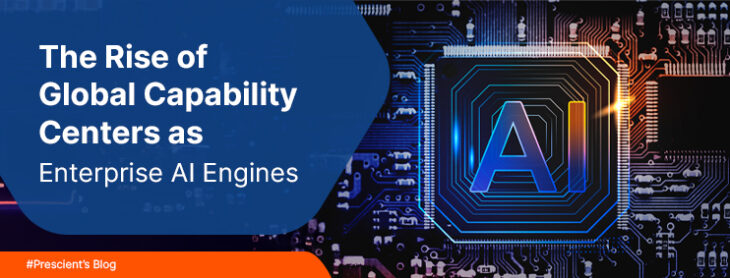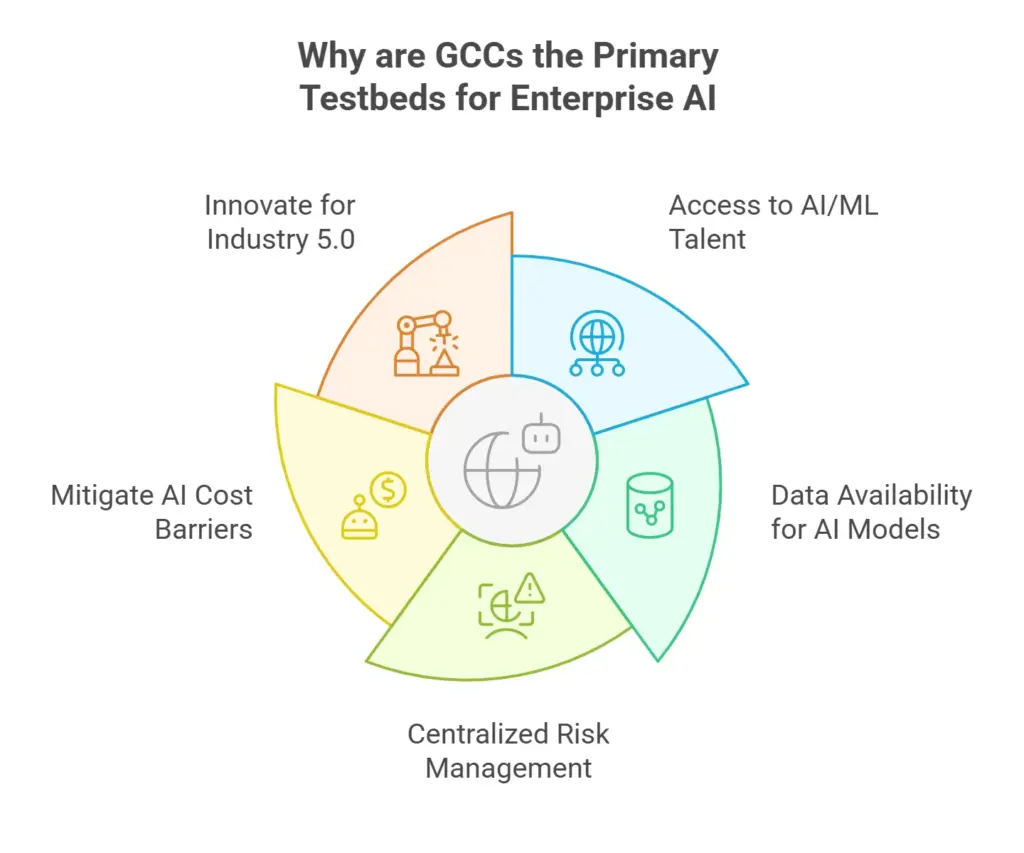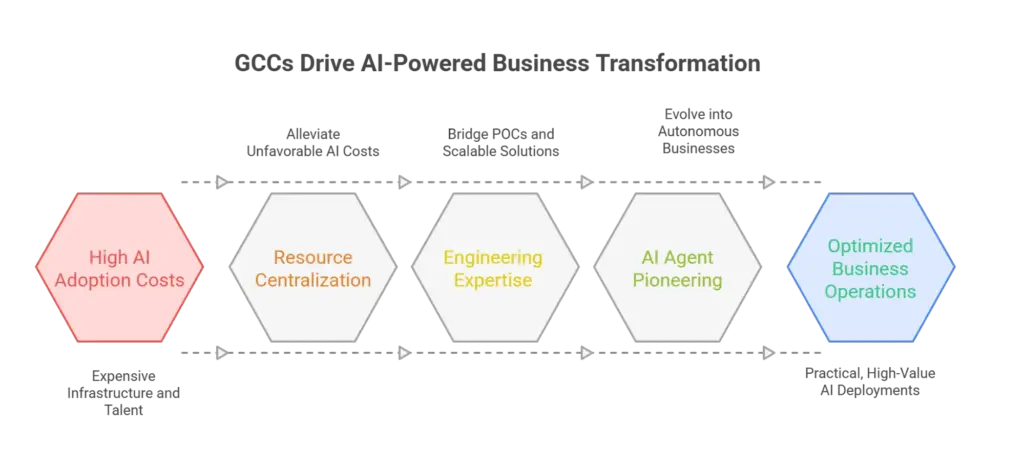The Rise of Global Capability Centers as Enterprise AI Engines
- Home
- Blog Details

- August 7 2025
- Pankaj Singh
Global Capability Centers (GCCs) have transformed from secondary cost-saving units into central engines of enterprise-wide innovation. These centers have become indispensable, uniquely positioned to accelerate and scale the deployment of AI-powered tools and platforms.
According to reports by EY and PwC, the value of work undertaken by GCCs globally could reach US$413 billion by 2030, representing the significant potential of digital-native talent and centralized innovation hubs. One of the key drivers for this growth is the accessibility to capabilities essential for AI success.
Why are GCCs the Primary Testbeds for Enterprise AI

Access to AI/ML Talent
The global AI market size will surpass US$3.6 trillion by 2034 (Precedence Research). However, the access to qualified talent is considered as a top barrier to successful AI implementation, even among ODCs and GCCs. Centers located in talent-rich ecosystems like India have emerged as key solution to this scarcity.
Indian GCCs alone have more than 120,000 AI and ML professionals as of 2025, with the demand witnessing a steady growth each year. The number of educational institutes offering artificial intelligence curricula has also surged to a notable extent.
- Data Availability for AI Models
For the development and improvement of any AI application, high-quality proprietary data is an essential fuel. Access to such data becomes a significant hurdle for many organizations, where a global capability center partner brings a certain advantage.
GCCs, unlike third-party vendors, can operate as fully integrated extension of the client. They function within an enterprise’s predetermined and regulated security perimeter, gathering and utilizing vast, sensitive datasets required to train, fine-tune, and validate sophisticated AI models.
It allows teams to develop highly valuable, domain-specific AI agents, such as a diagnostic tool for clinical trial data or a fraud detection model, providing a durable competitive advantage that cannot be replicated easily.
- Centralized Risk Management
In conjunction with the deployment of AI platforms, a new and complex landscape of risks emerges. These include cybersecurity vulnerability, regulatory non-compliance, IP infringement and algorithmic bias. A GCC partner helps establish a centralized risk management center for strengthening security and AI governance.
A recent survey by BigID stated that almost 64% of organizations did not have full visibility into their AI risks, exposing them to misuse of data misuse and compliance failures. Under strategic collaboration with a GCC provider, the development and deployment of AI occurs within a dedicated hub, as the enterprise enforces governance frameworks, responsible AI practices and robust cybersecurity protocols.
- Mitigate AI Cost Barriers
The CapEx requirements for enterprise AI is substantial and multi-layered. Organizations usually face expenses that can quickly escalate, making it difficult to reach a clear ROI. In a GCC, investments are centralized in a single unit, helping companies achieve economies of scale, avoid redundant infrastructure spending and delegate talent acquisition to a dedicated team.
As the capital and organizational cost of a risky venture is cut down significantly, a GCC partner makes less expensive innovation possible. It results in the business running more experiments due to a “fail-forward” approach, boosting the probability of achieving breakthroughs in product and reduce time-to-market.
- Innovate for Industry 5.0
Industry 4.0 brought along the need for AI-powered systems, including vision monitoring for industry security, edge computing architecture and digital twin, among others. In affiliation with a capable GCC partner, enterprises can now look to rapidly build advanced automated solutions to ride the emerging wave of Industry 5.0.
Industry 5.0 signifies an era where humans work alongside highly-sophisticated technology with more emphasis on human-centricity, sustainability, and resilience. This shift necessitates a combination of talent, technology and innovation which will cause a substantial rise in business costs.
A GCC provider can establish a focused lab for R&D, for instance developing a system for running cobots, leveraging their access to pre-built technology stacks and core engineering talent. The cost mitigation resulting from the partnership empowers the parent organization to develop, test, and scale new solutions that are smarter, safer and suited to both customer and workforce needs.
Table of Contents
ToggleHow can GCC Partner Accelerate your AI Transformation?

The strategic value created by Global Capability Centers in the AI era is best understood through their tangible impact on core business operations. By centralizing resources, a GCC provider alleviates unfavorable costs to acquire AI infrastructure and talent. Their deep engineering roots close the divide between proofs-of-concept and scalable solutions. The future of global capability centers is now invariably linked to the future of enterprise AI, as leading centers aim to pioneer the use of advanced “AI agents” and evolve into autonomous business.
Across industries, GCCs are moving beyond theory to spearhead practical, high-value AI deployments teams reshaping customer interactions, optimizing complex processes, and creating new sources of competitive advantage. These centers are not just implementing AI; they are engineering the next generation of business solutions.
Pankaj Singh has extensive experience in market research and content creation within the industrial sector. He currently writes insightful articles related to business, manufacturing, technology, and automation for Prescient Technologies.
- Pankaj Singh
- Pankaj Singh
- Pankaj Singh


